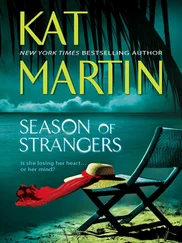She turned her head slightly and looked down. On her short cheek, the sunlight picked out the largest freckles, and Guy saw a certain pattern he remembered and had not thought of since a time when he had been married to her. How sure he had once been that he possessed her, possessed her every frailest thought! Suddenly it seemed that all love was only a tantalizing, a horrible next-best to knowing. He knew not the smallest part of the new world in Miriam’s mind now. Was it possible that the same thing could happen with Anne?
“Don’t you, Miriam?” he prompted.
“Not right now. See, there’re complications.”
“Like what?”
“Well, we might not be able to marry as soon as we’d like to.”
“Oh.” We. He knew what he would look like, tall and dark, with a long face, like Steve. The type Miriam had always been attracted to. The only type she would have a child by. And she did want this child, he could tell. Something had happened, that had nothing to do with the man, perhaps, that made her want a child. He could see it in the prim, stiff way she sat on the bench, in that self-abandoned trance he had always seen or imagined in pregnant women’s faces. “That needn’t delay the divorce though, I suppose.”
“Well, I didn’t think so—until a couple of davs ago. I thought Owen would be free to marry this month.”
“Oh. He’s married now?”
“Yeah, he’s married,” she said with a little sigh, almost smiling.
Guy looked down in vague embarrassment and paced a slow step or two on the asphalt. He had known the man would be married. He had expected he would have no intention of marrying her unless he were forced to. “Where is he? Here?”
“He’s in Houston,” she replied. “Don’t you want to sit down?”
“No.”
“You never did like to sit down.”
He was silent.
“Still have your ring?”
“Yes.” His class ring from Chicago, that Miriam had always admired because it meant he was a college man. She was staring at the ring with a self-conscious smile. He put his hands in his pockets. “As long as I’m here, I’d like it settled. Can we do it this week?”
“I want to go away, Guy.”
“For the divorce?”
Her stubby hands opened in a limp ambiguous gesture, and he thought suddenly of Bruno’s hands. He had forgotten Bruno completely, getting off the train this morning. And his book.
“I’m sort of tired of staying here,” she said.
“We can get the divorce in Dallas if you like.” Her friends here knew, he thought, that was all.
“I want to wait, Guy. Would you mind? Just a while?”
“I should think you’d mind. Does he intend to marry you or not?”
“He could marry me in September. He’d be free then, but—”
“But what?” In her silence, in the childlike lick of her tongue on her upper lip, he saw the trap she was in. She wanted this child so much, she would sacrifice herself in Metcalf by waiting until four months before it was born to marry its father. In spite of himself, he felt a certain pity for her.
“I want to go away, Guy. With you.”
There was a real effort at sincerity in her face, so much that he almost forgot what she was asking, and why. “What is it you want, Miriam? Money to go away somewhere?”
The dreaminess in her gray-green eyes was dispersing like a mist. “Your mother said you were going to Palm Beach.”
“I might be going there. To work.” He thought of the Palmyra with a twinge of peril. It was slipping away already.
“Take me with you, Guy? It’s the last thing I’ll ask you. If I could stay with you till December and then get the divorce—”
“Oh,” he said quietly, but something throbbed in his chest, like the breaking of his heart. She disgusted him suddenly, she and all the people around her whom she knew and attracted. Another man’s child. Go away with her, be her husband until she gave birth to another man’s child. In Palm Beach!
“If you don’t take me, I’ll come anyway.”
“Miriam, I could get that divorce now. I don’t have to wait to see the child. The law doesn’t.” His voice shook.
“You wouldn’t do that to me,” Miriam replied with that combination of threat and pleading that had played on both his anger and his love when he loved her, and baffled him.
He felt it baffling him now. And she was right. He wouldn’t divorce her now. But it was not because he still loved her, not because she was still his wife and was therefore due his protection, but because he pitied her and because he remembered he had once loved her. He realized now he had pitied her even in New York, even when she wrote him for money. “I won’t take the job if you come out there. There’d be no use in taking it,” he said evenly, but it was gone already, he told himself, so why discuss it?
“I don’t think you’d give up a job like that,” she challenged.
He turned away from her twisted smile of triumph. That was where she was wrong, he thought, but he was silent. He took two steps on the gritty asphalt and turned again, with his head high. Be calm, he told himself. What could anger accomplish? Miriam had used to hate him when he reacted like this, because she loved loud arguments. She would love one even this morning, he thought. She had hated him when he reacted like this, until she had learned that in the long run it hurt him more to react like this. He knew he played into her hands now, yet he felt he could react in no other way.
“I haven’t even got the job yet, you know. I’ll simply send them a telegram saying I don’t want it.” Beyond the treetops, he noticed again the new reddish building he had seen before Miriam came.
“And then what?”
“A lot of things. But you won’t know about them.”
“Running away?” she taunted. “Cheapest way out.”
He walked again, and turned. There was Anne. With Anne, he could endure this, endure anything. And in fact, he felt strangely resigned. Because he was with Miriam now, the symbol of the failure of his youth? He bit the tip of his tongue. There was inside him, like a flaw in a jewel, not visible on the surface, a fear and anticipation of failure that he had never been able to mend. At times, failure was a possibility that fascinated him, as at times, in high school and college, when he had allowed himself to fail examinations he might have passed; as when he married Miriam, he thought, against the will of both their families and all their friends. Hadn’t he known it couldn’t succeed? And now he had given up his biggest commission, without a murmur. He would go to Mexico and have a few days with Anne. It would take all his money, but why not? Could he possibly go back to New York and work without having seen Anne first?
“Is there anything else?” he asked.
“I’ve said it,” she told him, out of her spaced front teeth.
Four
He walked home slowly, approaching Ambrose Street, where he lived, through Travis Street, which was shaded and still. There was a small fruit shop now on the corner of Travis and Delancey Streets, sitting right on somebody’s front lawn like a children’s play store. Out of the great Washatorium building that marred the west end of Ambrose Street, girls and women in white uniforms were pouring, chattering, on their way to an early lunch. He was glad he did not meet anyone on the street he had to speak to. He felt slow and quiet and resigned, and even rather happy. Strange how remote—perhaps how foreign—Miriam seemed five minutes after talking with her, how unimportant, really, everything seemed. Now he felt ashamed of his anxiety on the train.
“Not bad, Mama,” he said with a smile when he came home.
His mother had greeted him with an anxious lift of her eyebrows. “I’m glad to hear that.” She pulled a rocker around and sat down to listen. She was a small woman with light brown hair, with a pretty, rather fine straight-nosed profile still, and a physical energy that seemed to twinkle off in sparks now in the silver of her hair. And she was almost always cheerful. It was this fact chiefly that made Guy feel that he and she were quite different, that had estranged him from her somewhat since the time he had suffered from Miriam. Guy liked to nurse his griefs, discover all he could about them, while his mother counseled him to forget. “What did she say? You certainly weren’t gone very long. I thought you might have had lunch with her.”
Читать дальше












